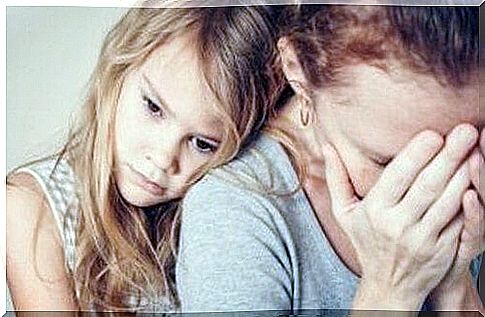Paranoid Personalities: Emotional Prisons

The children of parents with paranoid personalities exist, even if they are invisible to society. They suffer from the effects of disorganized attachment, emotional instability that leaves its mark and a very draining dysfunctional environment. They are the children at the greatest risk of suffering from mental disorders and who, together with their families, require greater medical-social attention.
People with personality disorders, schizophrenia, dissociative disorders, etc. also fall in love and have children. It’s obvious; however, many of them, not counting on adequate social and family support, lead to extreme situations that remain in the shade. We are talking about problematic dynamics of which we are not always aware.
It is very common, for example, for patients with paranoid personalities to neglect their care and for this problem to escalate. All this outlines situations that are sometimes very complicated, where children are the weakest link. It is therefore necessary to make these realities that occur daily in our closest scenarios more visible, where the disease outlines situations that require our attention and our sensitivity. What does it mean to have parents with paranoid personalities ?

Living with parents with paranoid personalities
We don’t know how or why this disorder develops. Generally speaking, it is thought to be the result of the complex triad in which biological, genetic and social factors are added together. It must be said that paranoid disorder is one of the most exhausting psychiatric conditions for several reasons: it affects all areas of the person making any personal, family and professional relationship very difficult.
Let’s see some features together:
- They are profiles characterized by a permanent mistrust. This disorder begins to emerge in adolescence, a moment in which behavior of perennial suspicion is shown, thinking that others always have bad intentions towards them.
- They continually suspect that they are deceived, betrayed, abandoned …
- Excessive concern about almost any aspect.
- Continuous need for loyalty and fidelity demonstrations.
- Bad management of their emotions, they are also unable to forgive or forget anything they consider an affront, to the point of holding a grudge forever and obsessively.
- They are hypervigilant. They have the radar always “on” in the face of any suspicion, danger or threat against their person.
- This mistrust also creates in them an often cold and hostile character. I’m always on the defensive.

Children of parents with paranoid personalities
Several studies have been carried out to investigate the impact of a parent with a paranoid personality on the growth of their children. First of all, it should be emphasized that the problem in these cases is twofold. We cannot forget that this disorder has a genetic weight, in other words there is a clear risk that the prevalence of this disease will be passed on from one generation to the next.
However, genetics never 100% determine the risk of a psychological disorder, it is undoubtedly the context in which one lives and the educational models received determine it . Let’s see what scientific research tells us about how children of parents with paranoid personalities grow and mature.
Children of parents with paranoid personalities: effects on growth and education
- At the age of two, children already show a more reserved gaze and less receptivity to external stimuli .
- The insecure, disorganized and stress-marked attachment causes these little ones to show behavioral patterns based on mistrust, hyperactivity, fear of abandonment, constant search for consolation …
- Another common factor that characterizes parents with paranoid personalities is emotional and educational incongruity. Sometimes they are very affectionate, while others show coldness and hostility.
- They are inconsistent with the rules and this generates high stress in the child’s brain development.
- Children have low self-esteem and a negative self-image.
- Emotional containment because parents invalidated their affective and emotional needs from the start.
- Generally speaking, they have a very low academic achievement.
- When the child becomes aware of the parent’s illness, he usually displays feelings of guilt.
- Paranoid personalities usually raise walls in front of their children’s socialization. With that, they try to avoid being abandoned.
- During adolescence it is common for criminal conduct to appear, as well as defiant attitudes, anxiety disorders, depression, etc.
Current interventions
Children of parents with paranoid personalities need personalized psychosocial intervention. Since the effects of an inconsistent and unpredictable family environment are very large, we cannot limit ourselves to children. The intervention must extend to the whole environment, including parents .

- It is essential to follow a psychotherapy based on the improvement of attachment. One or both parents are encouraged to talk about their childhood experiences and to link these events to their current relationship with the child, allowing them to understand how the cycle of disorganized and / or insecure attachment is perpetuated.
- Adequate family psycho-education must be encouraged in which to promote suitable support networks. Dynamics such as family skill training or the need to be consistent in matters of affections, rules, routines and habits are essential goals to be achieved in these families.
If the children of parents with paranoid personalities are already grown up and this problem is found in the school environment, the psychological intervention will be very precise. It will promote good self-esteem in the child or adolescent, to have a positive relationship with those around him, to have healthy interests and to equip him with strategies to reduce the stress generated by the mental illness of one or both parents.
These are very complex situations that require concrete and multidisciplinary support.









